
FROM THE QUEEN TO THE CHIEF EXECUTIVE
Hong Kong, 2001, 101 minutes, Colour.
Directed by Herman Tau.
From the Queen to the Chief Executive refers to the handing over of Hong Kong by Britain to the Republic of China. The film focuses on the Legislative Council before and after the handing over, the British administration under Chris Patten, the role of the chief executive and the judiciary after the hand-over. The focus is on juvenile offenders who have been detained at Her Majesty's pleasure. A lawyer fights for the rights for the youngsters to have a determined sentence, so that they can be eligible for parole. However, Chris Patten gives a grant to only a few of the applicants. After the hand-over, the judiciary issues very severe sentences, up to thirty years, more than for adult criminals.
The film opens in the year 2000, has flashbacks to the harsh family life of two of the central characters, two murderers? It then shifts to 1997 and the campaign by the counsellor and the families of the detained for justice. This continues through until 1998 when the determined sentences are handed down.
The film uses a lot of newsreel footage to give the film a semi-documentary tone. The film is one of special pleading, seriously asking its audience to have sympathy with juvenile offenders, not underestimating the horror of what they did, but looking at a just society which is able to rehabilitate criminals. At the end of the film, the parents of the couple murdered in 1985 also plead for clemency. The film is most worthy in its plea for social justice. The director has been more noted for his horror and gory films rather than the plea for social justice. The actor who portrays the counsellor practised as a lawyer for a year, defending juvenile criminals, before becoming an actor - his comment is that lawyers have to act just as strongly as actors in theatre.
1. The film as a film of special pleading for justice? The significance of the title? The tradition of Hong Kong justice, British administration, Chris Patten and his administration? The Legislative Council, the transition and hand-over, the role of the council afterwards, the chief executive and the judiciary? The severity of the sentences - and because executive, no appeal?
2. The use of television and newsreel material, air of authenticity about the courts, the Legislative Council, the ceremonies of hand-over? Combined with the action and the narrative? The musical score - with the range of contemporary songs?
3. The initial focus on the counsellor and his pleading to the chief executive for justice, the ignoring of letters, the back experience of judiciary?
4. The flashbacks to 1985: Braemar Park, the gang, the young couple, the decision to rob, the brutality of the murder, Ming and his being involved - otherwise being killed by the chief. The arrest, the sentence, being detained at Her Majesty's pleasure, twelve years in jail? The contrast with the young girl, coming from the country and not wanting to come to Hong Kong, her neurotic mother, the cutting up of the dress? The uncle and the sexual abuse of the young girl, her not knowing what was happening? Her mother taking her uncle's side? The young girl, vindictive, the attempt to kill her mother?
5. The counsellor, the plea by the relative of the accused? The young girl and her going to see Ming in prison? Her decision to help him - yet her shyness, self-consciousness? Their having shared studies and Ming doing well in his studies? Her fearfulness in visiting the prison?
6. The counsellor, the families, the range of protests, the articles? Headbands, protests? The clashing with the people who objected to their cause? Having to keep control?
7. The young woman, her not wanting to see Ming, self-conscious about her own situation? Finally going back to see him and her upset? Her response to his wanting to find his natural mother? Her going to see her own mother, the reconciliation, explaining her past, the mother keeping the dress? A future?
8. The councillor, the discussion with the other councillors and their negative attitude? The meeting before the hand-over and the vote against him? His sense of frustration? His own personal life, not being able to go to the movies with his son? Divorce? His own staff turning against him and his strong stance? His special pleading in the council? His having to be more detached?
9. Ming, the friends in prison, the treatment of the guards? Their cases being presented to the council? After the hand-over, listening to the radio, the individual visits to the chief and their being told their harsh sentences? The article with the pardon by the parents? Ming and the discussion about suicide, his attempt, failure? His being haunted by the nightmares of what he had done in Braemar Park?
10. The girl and her going to see Ming, his accepting his sentence and living day by day? The possibility of appeal? The role of the councillor? The young woman going to find Ming's mother?
11. The film and its issues of social justice, not solely for Hong Kong but worldwide?